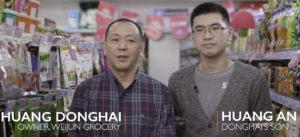Weekly Focus: Alibaba Goes for Convenience, Convicts & Cars

This week, we kick off the new year with a look at how Alibaba is adding merchants to its ecosystem by modernising China's convenience stores as well as arming local prisoners with e-commerce skillsets.
The Chinese online retailer runs a programme that aims to suit up mom-and-pop shops with the latest technology and data analytics, so these small retailers can streamline and automate their operations.
Called Ling Shou Tong, or 'integrated retail', the initiative is Alibaba's bid to bring China's six million convenience stores online and connected to its platform. Through its app, these bricks-and-mortars can access a centralised order and distribution system, reducing the need to deal with multiple suppliers and giving storeowners a wider selection of goods.
Through an integrated point-of-sales system, they can track their inventory, as well as offer mobile payment options. Shelves also can be restocked the next day from Alibaba's warehouses in the city, or within two days from regional warehouses. In addition, store owners can access data analytics and insights on popular items and tweak their stockpile to meet demand. FMCG brands, too, gain insights from data collected from these convenience stores, enabling them to package their goods to suit consumers' needs.
According to Alibaba, more than 80% of convenience store owners in the country are aged 45+. To help them get online, external consultants are roped in to implement the backend systems and guide the merchants on how they can tap the Ling Shou Tong app to improve their business. For instance, they can get insights on what to procure, how to display their merchandise, and offer in-store promotions.
For their time, these external tech consultants get a commission on what the retailers order from Ling Shou Tong.
For one store owner, Huang Donghai, the initiative enabled him to keep pace with market changes and access tools previously unavailable to him. "In the past, we had a lot of difficulties. We couldn't catch up with this day and age. We had to transform and upgrade", said Huang, who operates his store in Hangzhou with his son, Huang An.
The younger Huang said: "They give us access to services we couldn't get before, like top brands and new technology."

Alibaba also is bringing e-commerce skillsets to people who may not have the means to arm themselves with such knowledge. Specifically, instructors at its Taobao University conduct courses for inmates at Qiao Si Prison, who learn the skills they will need to run online stores, including dealing with customers and merchandising.
The prison offers such courses as part of its pre-release reintegration scheme, which aims to help convicts have a smoother transition when they re-enter society upon release. E-commerce is seen as an ideal way to ease former inmates back into the workforce, which they may find tough re-entering due to their prior record.
Bringing digital experiences on the road
In a separate announcement, Alibaba said it inked an agreement with BMW to jointly develop "digitalised experiences for the car and home" for all new models the German automaker would market in China, from the first half of 2018.
Under the partnership, BMW drivers in the country would be able to use web-connected speakers to remotely access information about their cars. For instance, they could determine if they left their windows or doors open, as well as how far they could drive on the current fuel level.
The carmaker would work with Alibaba Cloud's Internet of Things (IoT) business unit to implement its BMW Connected in-car infotainment system for customers in China. The smart speakers would be integrated with the German company's cloud-based system as well as Alibaba's sound recognition and processing technology.
BMW China's vice president of digital services and business models, Joseph Zheng, said: "BMW Group is working to shift from a traditional luxury auto manufacturer and service provider, to a technology company, with automated driving, digital connectivity, mobility services, and electrification as some of the central pillars of our new strategy."
Chief scientist for Alibaba's IoT business, Sean Ding, added that the partnership would offer "new experiences", connecting people with their vehicles and homes. It also had the potential to extend remote access to vehicles, enabling owners to turn on the heater and warm up their cars during winter before entering, as well as control their refrigerator from inside their cars.
Ding said: "People, on average, spend 10 hours a day at home. In the US, people spend an average of one hour in their cars per day and, for China, it may be even longer due to the traffic. How can we change people's lives through technology and enhance lifestyles? [Through] living spaces and transport."This content was originally published in RetailTechNews.








Follow ExchangeWire